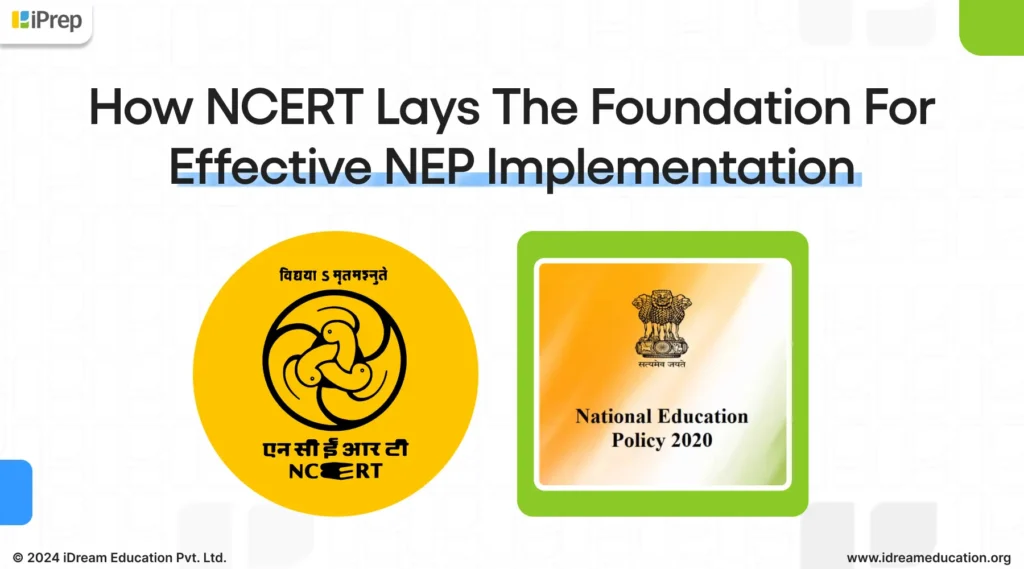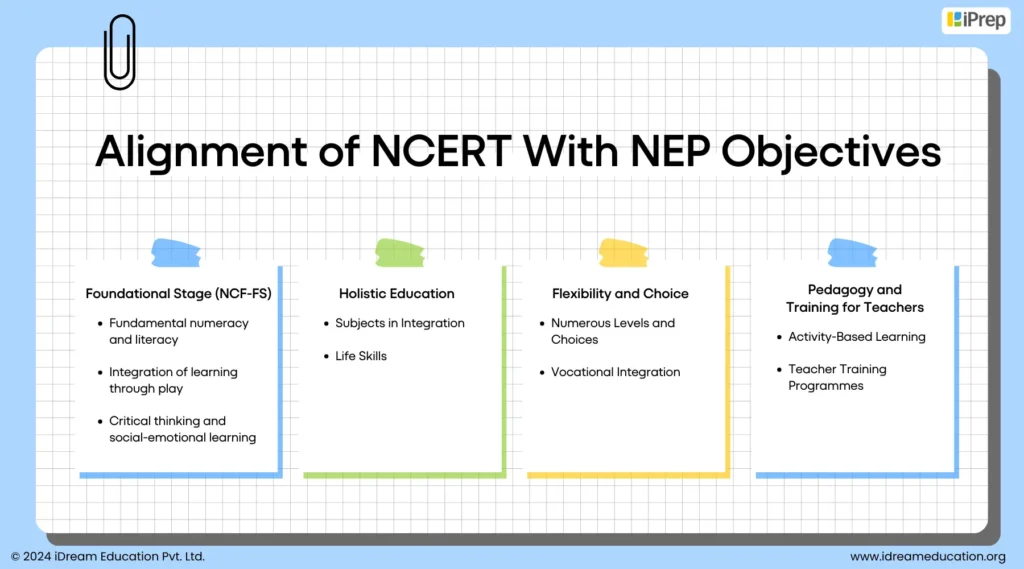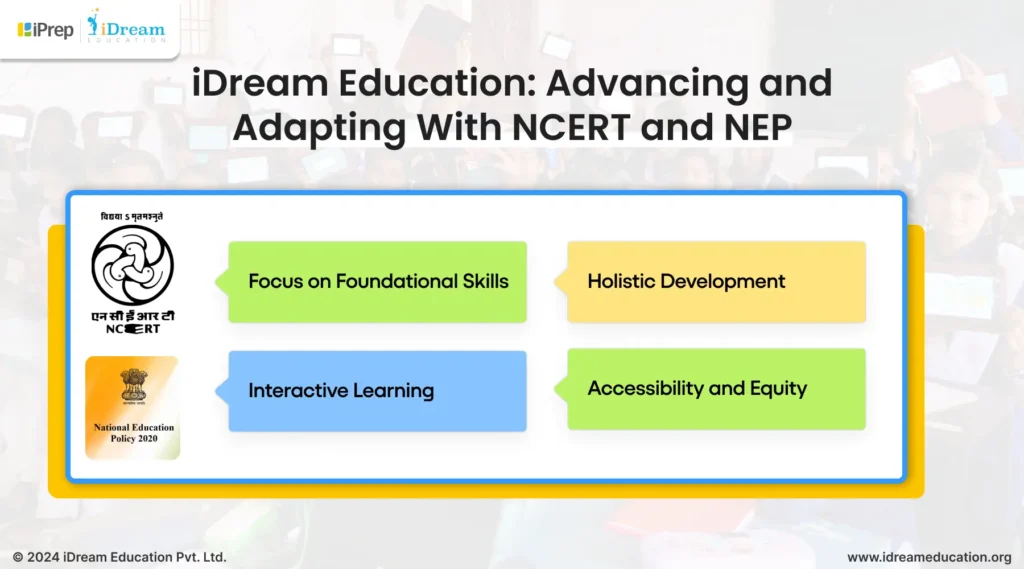How NCERT Lays The Foundation For Effective NEP Implementation

National Education Policy (NEP) 2020 establishes an ambitious vision for the transformation of Indian education. Its success, however, hinges on effective implementation across the enormous and diverse school system. The achievement of its ambitious goals is contingent upon a strong groundwork, which the National Council of Educational Research and Training (NCERT) has scrupulously established. NCERT, having been in charge of pedagogical innovation and curriculum development for several decades, establishes itself not only as a crucial participant but also as the foundation that supports the NEP’s overall achievements to date. In this blog post, we’ll delve into the symbiotic relationship between NCERT and NEP- The National Education Policy (NEP), unveiling how NCERT’s expertise, collaborative ethos, and groundbreaking platforms like Diksha converge to pave the path for effective implementation and a brighter future for Indian education.
The Guiding Light: NCERT’s Role in Indian Education
NCERT has functioned as the preeminent governing body for teacher training and curriculum development in India. Its extensive national reach and pedagogical expertise position it uniquely to support the NEP’s objectives. NCERT has long served as the guiding organization for Indian education. It has guided Indian education for more than 50 years and has evolved into more than just a curriculum creator. NCERT is now a leading pedagogical authority, influencing the educational journey for millions of students throughout the country.
The reason for NCERT’s continued existence is its steadfast dedication to multiple crucial facets such as:
Knowledge of Curriculum Development: NCERT has a group of highly skilled teachers and subject-matter specialists who painstakingly create curriculum frameworks that are both comprehensive and flexible enough to meet a variety of local demands.
Prioritizing Relevance and Quality: Relevance and quality are given top priority in the NCERT curriculum development process. To keep frameworks up to date with the most recent developments in pedagogy and the changing demands of the labor market, they evaluate and adapt them frequently.
National Reach and Influence: Government and private schools in India use the NCERT frameworks as a guide. This guarantees, irrespective of location, a certain degree of consistency and quality in education.
A Consistently Positive Impact: The impact of NCERT goes beyond creating curricula. It actively supports educational research, shares best practices via training sessions and workshops, and is a major influence on national education policy. Serving as a focal point for knowledge and resources related to education, NCERT has grown to be a vital organization in India’s educational system.
Let’s now get into understanding its alignment with the objective of National Education Policy (NEP)
Alignment of NCERT With NEP Objectives

Numerous NEP objectives are already established upon NCERT’s pre-existing curriculum frameworks, such as the National Curriculum Framework. Let’s understand those establishments one by one starting with:
Foundational Stage (NCF-FS)
- Fundamental numeracy and literacy: This emphasis is in complete accordance with the NEP’s objective of providing young learners with robust foundational abilities.
- Integration of learning through play: The significance of play in early childhood education is acknowledged by the NEP, and NCERT’s frameworks promote the implementation of this method in lower grade levels.
- Critical thinking and social-emotional learning: NCERT’s curriculum places significant importance on social-emotional learning and critical thinking, surpassing mere memorization in its approach to imparting these vital competencies following the NEP.
Holistic Education
Subjects in Integration: A comprehensive approach to learning is emphasized by the NEP. In line with the NEP’s goals, NCERT is including more social sciences and language arts into its curriculum, including science and maths.
Life Skills: In line with the NEP’s emphasis on preparing students for obstacles they may face in the real world, NCERT is introducing life skills development into its curricula. This could involve problem-solving, communication, and financial literacy.
Flexibility and Choice
Numerous Levels and Choices: The NEP promotes a variety of educational pathways. NCERT is creating textbooks at varying degrees of difficulty and offering extra resources to accommodate varied learning tempos and styles.
Vocational Integration: Vocational education is supported by the NEP. NCERT is attempting to incorporate career alternatives into the regular curriculum, as the NEP’s “5+3+3+4” framework envisions it.
Pedagogy and Training for Teachers
Activity-Based Learning: In line with the NEP’s recommendation for a move away from rote memorization and towards a more dynamic and engaging pedagogy, NCERT is promoting activity-based learning approaches in all subject areas.
Teacher Training Programmes: To provide educators with the abilities and information necessary to successfully use the pedagogical techniques of the NEP, NCERT is redesigning its teacher training programs.
That’s not it, the NCERT department is also bridging the resource gap in school-based education. Let’s unfold that in our next section.
Bridging the Resource Gap for Effective NEP Implementation: NCERT’s Diksha Platform
The National Education Policy (NEP) prioritizes providing all students with equal access to learning materials of superior quality. In this respect, the NCERT Diksha platform emerges as a game-changer. This free, online repository serves as a national digital infrastructure for sharing educational resources (OERs) aligned with NCERT’s curriculum frameworks, flawlessly complementing the NEP’s vision.
Diksha facilitates effective NEP implementation in the following ways:
Accessibility: Diksha surpasses the confines of geographies. Teachers and students throughout India have unrestricted access to a vast library of learning resources available in multiple Indian languages, including lesson plans, videos, eBooks, audio guides, and more, irrespective of location or socioeconomic status. This ensures students in remote areas or those with limited resources have access to the same quality materials as their urban counterparts.
Conformity with NEP Objectives: The Diksha resources have been carefully selected and organized by the NEP’s key areas of focus. Educators can locate captivating resources that foster fundamental literacy and numeracy skills, incorporate play-oriented instruction for younger grade levels, and cultivate critical thinking and social-emotional development. This enables them to implement pedagogies envisioned by the NEP within their classrooms.
Flexibility and Enrichment: Diksha provides educators with the ability to locate supplementary materials that enhance their current lesson plans or accommodate a wide range of learning preferences. They can increase students’ engagement and effectiveness in the learning process through the use of interactive animations, simulations, and videos. This flexibility empowers them to personalize their teaching approach.
Teacher Training and Support: Diksha can also be a valuable tool for teacher training and professional development. It provides access to webinars, training modules, and examples of best practices that are by the NEP. This allows teachers to stay updated on the latest pedagogical approaches and implement them effectively in their classrooms.
All this makes the Diksha platform, a promising tool by the NCERT department that adds to the effective implementation of the National Education Policy (NEP). That’s still not it. The NCERT department took a few more major steps for the effective implementation of the National education policy. Let’s have a look at them in the following sections.
Collaboration for Success
The NEP’s successful implementation requires collaboration across all levels. NCERT recognizes this and is working closely with states and educational institutions. The framework serves as a central component, allowing for state-level modifications that guarantee the curriculum’s continued applicability to local requirements.
Several education experts have mentioned that NCERT’s collaborative approach is key to its contribution to the effective implementation of the National Education Policy (NEP). By working together, NCERT can ensure the NEP reaches all corners of India and benefits every child. But what’s the road ahead now for the NCERT department? Let’s answer that question in the next section.
The Road Ahead For NCERT
As an evolving document, the NEP’s vision for education in India will continue to develop. NCERT, as a pivotal player in this journey, must remain agile and adaptable. That will ensure its resources and frameworks stay relevant in the years to come.
Here’s how NCERT can navigate the road ahead
Continuous Curriculum Review: This involves consistently evaluating and revising curriculum frameworks following input from educators, students, and subject matter experts. It will guarantee that they continue to correspond with the NEP’s progressive vision and the most recent developments in pedagogy.
Prioritizing Teacher Training: NCERT may persist in the creation and distribution of pioneering teacher training initiatives. This will furnish instructors with the requisite expertise and competencies to execute the NEP within their instructional settings proficiently. This includes instruction on the effective integration of technology and the utilization of digital learning tools.
Fostering Innovation: NCERT can play a critical role in encouraging and supporting the development of innovative teaching and learning materials. Potential collaborations with educational technology firms such as iDream Education could be considered to investigate novel approaches for providing effective and captivating learning experiences.
Embracing Technology: By embracing technological advancements, NCERT can further exploit its potential by expanding platforms such as Diksha and investigating novel methods of distributing educational resources. This could involve creating mobile apps or developing online learning communities for teachers and students.
By actively engaging in these areas, NCERT can ensure it remains at the forefront of educational development in India. As the NEP continues to shape the future of education, NCERT’s adaptability and commitment to continuous development will be crucial in creating a vibrant and enriching learning environment for every child in India.
iDream Education: Advancing and Adapting With NCERT and NEP

An emphasis is placed on a transition towards a more experiential and engaging learning environment in the National Education Policy (NEP) 2020. This is where digital learning solutions like those offered by iDream Education come into play. iDream’s comprehensive suite of digital tools and content is not only aligned with NCERT’s curriculum frameworks but actively supports the core principles of the NEP.
Here’s how iDream Education Complements The NEP Vision
Focus on Foundational Skills: iDream’s programs prioritize establishing strong foundational literacy and numeracy skills, echoing a key tenet of the NEP.
Interactive Learning: The NEP promotes interactive learning as an alternative to memorization-based learning. Therefore, iDream Education’s digital platform incorporates interactive elements, gamification, and engaging activities to make learning fun and effective.
Holistic Development: The NEP recognizes the importance of holistic development including social-emotional learning and critical thinking. Thus, iDream Education’s content goes beyond textbooks, encouraging students to develop these crucial competencies through simulations, problem-solving exercises, and collaborative learning tools.
Accessibility and Equity: The NEP seeks to ensure inclusive and equitable education for all. Therefore, iDream Education’s digital platform provides enhanced accessibility to education for students residing in various geographical locations and possessing distinct learning requirements through its adaptability and flexibility.
iDream Education’s Alignment With NCERT
iDream’s curriculum adheres strictly to the frameworks spelled out by NCERT. This assures seamless integration with what students are learning in school. An example of their dedication to bolstering national educational endeavors is iDream’s provision of more than 300 animated video lessons of exceptional quality to the NCERT’s Diksha platform.
For students in grades 1 through 12, iDream Education provides an extensive library of digital learning materials. These materials closely adhere to the NCERT curriculum. This comprises:
Rich and Captivating Content: We offer practice with immediate feedback, assessments, animated courses, and notes. These reaffirm the subjects taught in NCERT textbooks.
Coverage of the Syllabus: Our curriculum covers every important subject as delineated by NCERT. Ultimately, this guarantees that students grasp the entire curriculum effectively.
Emphasis on Understanding: iDream Education’s learning materials emphasize gaining a thorough comprehension of the material rather than just memorization.
Multilingual Usability: Acknowledging India’s multilingual terrain, iDream Education provides learning resources in Hindi, English, and 7 other regional languages. This is in addition to future support for more regional languages.
Altogether, by using iDream’s digital learning solutions alongside NCERT-based curriculums, schools can create a dynamic and engaging learning environment that correlates perfectly with the NEP’s vision.
Let’s Conclude
In summary, NCERT has a pivotal role in aligning with the goals of the National Education Policy (NEP) 2020. That way, NCERT lays a solid foundation for transforming Indian education by adding to the implementation of NEP. Through its expertise, collaborative approach, and innovative platforms like Diksha, NCERT ensures the effective implementation of the NEP’s objectives across diverse educational landscapes. Looking ahead, NCERT’s commitment to adaptation, teacher training, innovation, and technology integration, alongside partnerships with organizations like iDream Education, promises a brighter future for Indian education, empowering every child to succeed.







